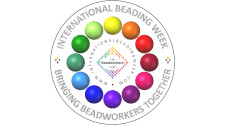
Quintessa’s employees find opportunities to use mathematics in unexpected places! Patricia Verrier has a keen interest in mathematical artwork and is combining mathematics and beadwork as an ambassador for International Beading Week!
Patricia has always been interested in craftwork and started learning beadwork more than 20 years ago. She runs a blog about mathematics and beadwork, focusing on investigating how to make geometric shapes and polyhedra out of beads. This year she is also acting as an ambassador for International Beading Week, 25ᵗʰ July - 2ⁿᵈ August 2020, an event run by the UK Beadworkers Guild to bring beaders together and to encourage the wider public to learn about the craft and hopefully try some beading!
As part of the week Patricia has put together some free detailed instructions for a beadwork version of the Five Intersecting Tetrahedra origami geometric model (Figure 1) originally designed by Thomas Hull, with permission from Thomas Hull to do the beadwork design. This shape is made up of five intersecting tetrahedra inscribed within a dodecahedron. If the tetrahedra are made from just a frame rather than as a complete solid then the they link together instead of intersect. With the right size of frame the whole shape locks together to make a beautiful geometric shape.

You can get long thin beads called bugles that can be used to make such frames. With a bit of geometry, the exact size of the bugle beads needed to make the model lock can be calculated – a ratio of width to length of 1:13.5441, slightly different to the origami version as the beads have a different profile to the paper components. Luckily, it’s possible to get bugle beads that are almost exactly this ratio! The result is a sparkly geometric model (Figure 2) that’s great fun to make, even for those new to beading. If you’d like to give it a try, the instructions can be downloaded as a pdf, with other free downloads also available as part of the week!
You can also read more about beadwork versions of the five intersecting tetrahedra.

Lead Image: The International Beading Week logo is provided by the Beadworkers Guild for use promoting the week.